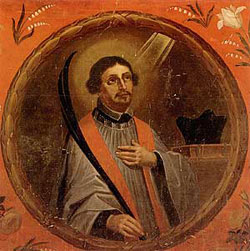
Feastday: January 14
Patron: of Nola, Italy
Felix was the son of Hermias, a Syrian who had been a Roman soldier. He was born on his father's estate at Nola near Naples, Italy. On the death of his father, Felix distributed his inheritance to the poor, was ordained by Bishop St. Maximus of Nola, and became his assistant. When Maximus fled to the desert at the beginning of Decius' persecution of the Christians in 250, Felix was seized in his stead and imprisoned. He was reputedly released from prison by an angel, who directed him to the ailing Maximus, whom he brought back to Nola. Even after Decius' death in 251, Felix was a hunted man but kept well hidden until the persecution ended. When Maximus died, the people unanimously selected Felix as their Bishop, but he declined the honor in favor of Quintus, a senior priest. Felix spent the rest of his life on a small piece of land sharing what he had with the poor, and died there on January 14. His tomb soon became famous for the miracles reported there, and when St. Paulinus became bishop of Nola almost a century later (410), he wrote about his predecessor, the source of our information about him, adding legendary material that had grown up about Felix in the intervening century. His feast day is January 14th.
We ask you, humbly: don't scroll away.
Hi readers, it seems you use Catholic Online a lot; that's great! It's a little awkward to ask, but we need your help. If you have already donated, we sincerely thank you. We're not salespeople, but we depend on donations averaging $14.76 and fewer than 1% of readers give. If you donate just $5.00, the price of your coffee, Catholic Online School could keep thriving. Thank you.Help Now >
For other people named Felix, see Felix (name).
Saint Felix of Nola (d. ca. 250) was a Christian presbyter at Nola near Naples in Italy. He sold off his possessions in order to give to the poor, but was arrested and tortured for his Christian faith during the persecution of the Roman emperor Decius (r. 249–51). He was believed to have died a martyr's death during the persecution of Decius or Valerian (ca. 253), but is now listed in the General Roman Calendar as a confessor of the faith, who survived his tortures.
Legend
Felix was the elder son of Hermias, a Syrian centurion who had retired to Nola, Italy. After his father's death Felix sold off most of his property and possessions, gave the proceeds to the poor, and pursued a clerical vocation. Felix was ordained by, and worked with, Saint Maximus of Nola.
When bishop Maximus fled to the mountains to escape the persecution of the Roman emperor Decius, Felix was arrested and beaten for his faith instead. He escaped prison, according to legend being freed by an angel, so that he could help bishop Maximus. Felix found Maximus alone, ill, and helpless, and hid him from soldiers in a vacant building. When the two were safely inside, a spider quickly spun a web over the door, fooling the imperial forces into thinking it was long abandoned, and they left without finding the Christians. A subsequent attempt to arrest Felix followed, which he avoided by hiding in a ruined building where again spider web was spun across the entrance convinced the soldiers the building was abandoned. The two managed to hide from authorities until the persecution ended with the death of Emperor Decius in 251.
After Maximus's death, the people wanted Felix to be the next bishop of Nola, but he declined, favoring Quintus, a "senior" priest who had seven days more experience than Felix. Felix himself continued as a priest. He also continued to farm his remaining land, and gave most of the proceeds to people even poorer than himself.
Legend assigns to Felix a martyr's death either in the year 255 under Emperor Valerian (253–260) or, in another version, in the general persecution instigated by the Emperor Decius (249-251). According to Butler, Felix died in a good old age, on the fourteenth of January.
 Burial place of Felix of Nola in Cimitile
Burial place of Felix of Nola in Cimitile
Much of the little information we have about Felix comes from the letters and poetry of Saint Paulinus of Nola, re. When at length peace was obtained, he returned home and in poverty lived a withdrawn life until old age, an unconquered confessor of the faith".
Five churches have been built at, or near the place, where he was first interred, which was without the precincts of the city of Nola. His precious remains are kept in the cathedral; but certain portions are at Rome, Benevento, and some other places. In time a new church in Nola was dedicated in the name of St Felix. People travelled from far away to see the burial place of this revered saint.
He should not be confused with another Saint Felix of Nola, of about a century later, whose feast is on 15 November.





